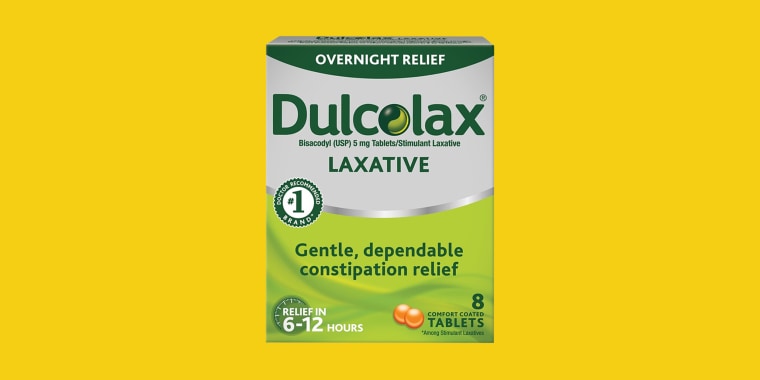Amid high demand for laxatives, doctors are cautioning people not to overuse the products or take them for purposes other than constipation relief, such as weight loss.
Pharma giant Sanofi said its over-the-counter laxative, Dulcolax, is facing supply constraints.
“Over the past few months, we have seen unprecedented demand for Dulcolax products," a Sanofi spokesperson said. "As a result, some retailers temporarily may not have certain Dulcolax products on their shelves.”
And Haleon, the maker of Benefiber — a dietary fiber supplement that is sometimes taken off-label as a laxative — said it has also seen a rise in demand, though no shortages.
"Increased demand stems from new, younger consumers coming into the marketplace who are taking a more proactive approach to their health and wellness — inclusive of gut health," a company spokesperson said.
Meanwhile, The Wall Street Journal reported last week that demand for polyethylene glycol 3350, the generic name for MiraLax, has led to shortages in some drugstores. However, the Food and Drug Administration has not reported a national shortage, and Bayer, the maker of MiraLax, did not respond to requests for comment.
Four gastroenterologists interviewed said that although they have not observed an increased demand for over-the-counter laxatives among their patients, several factors are likely fueling the trend.
Over time, they said, more people have come to see constipation as an illness — especially now that more prescription treatments are available and advertised. The median age in the U.S. has also reached a record high (nearly 39 years), and people have become more sedentary, are eating less healthy diets and are taking more medications than ever, all of which can contribute to constipation.
"The longer you live, the more illnesses you're likely to get, the more medications you're likely to take. So it all kind of compounds on itself," said Dr. Darren Brenner, a gastroenterologist at Northwestern Medicine.
Whereas U.S. consumers spent around $800 million on over-the-counter laxatives in 2002, that total has risen to more than $1.5 billion annually.
Around 16% of U.S. adults have constipation symptoms, according to the American Gastroenterological Association. But some people aren't using laxatives to ease that condition, taking them instead to lose weight — a longstanding practice that doctors and nutrition experts strongly advise against.
On TikTok and other social media platforms, some users have even posted videos suggesting, without scientific evidence, that MiraLax helps them "detox" or reduce bloating.
“They could be promoting use of laxatives for weight control, they could be talking about their regretful past of their use of laxatives for weight control. But either way, that’s getting into the hands of people — particularly young people — as like, ‘Oh, this is an option. This is something I could potentially use,’” said Kendrin Sonneville, an associate professor of nutritional sciences at the University of Michigan School of Public Health.
Doctors warn against laxatives for weight loss
Doctors generally recommend over-the-counter laxatives to treat constipation after a patient has tried exercising and consuming more fiber and fluids. Then they typically suggest osmotic laxatives like MiraLax, which pull water into the bowel from other parts of the body and soften stools.
Stimulant laxatives, by contrast, expel stool from the body by stimulating the colon muscles. They're more likely to result in side effects such as cramping, gas and bloating, so doctors usually don't recommend them for daily use.
No one should take laxatives for weight loss, doctors said.
“If you think about using laxatives to lose weight, the only thing you’re doing is purging water and stool, which are not part of your body mass,” said Dr. William Chey, chief of the gastroenterology division at the University of Michigan Medical Center.
Abusing laxatives in this way may lead to dehydration, cramping, nausea, vomiting or low potassium levels in the blood, which can increase the risk of a heart attack. Sonneville said regularly taking laxatives for issues other than constipation can also increase the risk of pancreatitis or kidney stones.
Laxatives aren't the only option for constipation
According to Dr. Lin Chang, vice chief of the division of digestive diseases at UCLA, some people may think they need laxatives when they don't — say, for purposes like alleviating stomach cramps.
“We’re all kind of hardwired to believe that, ‘If I have any discomfort, if I go to the bathroom I’m going to feel better,’” Chang said. (The majority of over-the-counter laxatives haven’t been shown to improve abdominal symptoms.)
Others may falsely believe that they need to have at least one bowel movement every 24 hours.
"The normal bowel habit frequency in the general population is three times a day to three times a week," Chang said.
For people who are constipated, laxatives aren't the only option, Brenner noted.
"There's data to show that fruits like prunes, kiwi, mangoes can be effective for some people," he said. "The way that you sit on a toilet — position modifying devices, what we call PMDs — can be effective for some individuals."
It's possible to become too reliant on laxatives, he added.
"If you notice you're having to start to increase the dose because it's no longer effective, that's the time to contact your practitioner for other recommendations," Brenner said.
Generally, the standard medical advice is to stop using over-the-counter laxatives after two weeks, though the medicines can be beneficial for longer in some cases.
People taking laxatives who experience sudden weight loss, blood in their stool or constipation lasting more than three months should see a doctor, said Dr. Satish Rao, a professor of medicine at Augusta University.
"I would not recommend anybody with chronic constipation venture on their own" with laxatives, he said. "Without a proper diagnosis, you may harm yourself."

